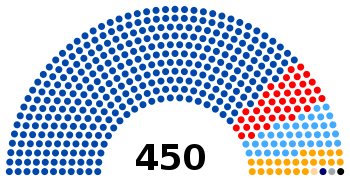
As the vote counts are being finalized for this election held 18 September, we have the following results for the Russia legislative elections (the Duma):
- United Russia (Putin’s party) = 54% of popular vote
- 343 seats, up from 238 in 2011.
- Communist Party (yes, those dinosaurs) = 13%
- 42 seats, down from 92 in 2011.
- Liberal Democratic Party of Russia (mad Vladimir Zhirinovskii’s party) = 13%
- 39 seats, down from 56 in 2011.
- A Just Russia (a moderate, well-behaved reformist party) = 6%
- 23 seats, down from 64 seats in 2011.
Two other seats are held by two other parties. Fourteen parties participated in the election. Duma members serve for 5 years (next Duma election is in 2021).
A significant part of the story though is voter turn-out. In the bad old days of the Soviet Union, voter turn-out used to be very high. Even in 1990 (under Gorbachev) it was 77%. It was 60.1% in 2011. It was 47.88% in this election (and there is some question about this figure). It is the lowest turn-out figure to date. In the two major cities of Moscow and St. Petersburg turn-out was low. For Moscow it was less than 35%, down from 66% in 2011. This is worth noting. There were no major post-election protests, unlike in 2011. Crimea did vote in the Russian election.
Several opinion polls from September shows United Russia with 39.3 to 43% of the vote and two exit polls show it with 44.5 and 48.4% of the votes. There were some voting irregularities reported. United Russia won 54.2% of the popular vote in an election of with a turn-out of 47.88%.
United Russia now has 343 out of 450 seats in the Duma. This is 76% of the seats. Half the seats were elected based upon proportional voting based upon party lists and half were elected based upon single-member constituencies. This was a change from the 2011 elections. United Russia does have a “supermajority” which now allows them to unilaterally change the constitution. This is probably a very important point. For all practical purposes, Russia is now a “single-party democracy.”
From 1999 to 2013 the Russian economy boomed at unprecedented levels. From 2014 to the present, it has been in decline. Next election is the presidential election of March 2018.
